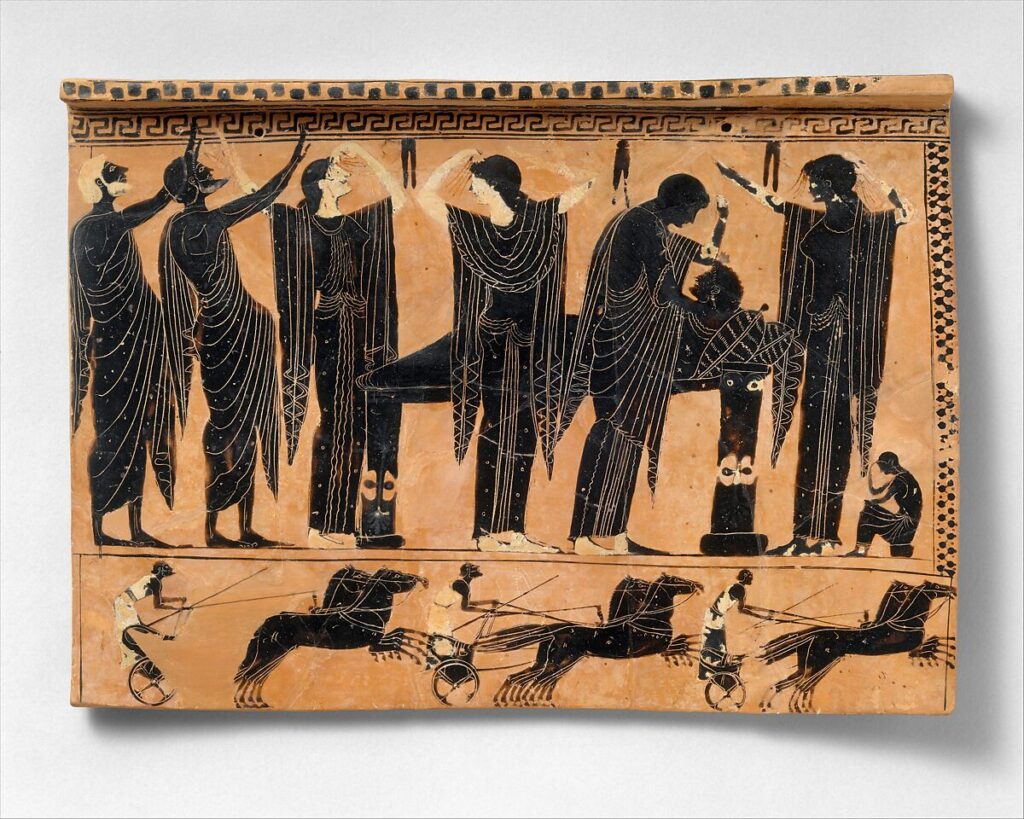
5.7
[1] At illae sorōrēs percontātae scopulum locumque illum quō fuerat Psȳchē dēserta festīnanter adveniunt ibique difflēbant oculōs et plangēbant ūbera, quoad crēbrīs eārum heiulātibus saxa cautēsque parilem sonum resultārent. [2] Iamque nōmine propriō sorōrem miseram ciēbant, quoad sonō penetrābilī vōcis ululābilis per prōna dēlāpsō āmēns et trepida Psȳchē prōcurrit ē domō et: “Quid” inquit “vōs miserīs lāmentātiōnibus necquicquam efflīgitis? Quam lūgētis, adsum. [3] Lūgubrēs vōcēs dēsinite et diūtinīs lacrimīs madentēs genās siccāte tandem, quippe cum iam possītis quam plangēbātis amplectī.”
[4] Tunc vocātum Zephyrum praeceptī marītālis admonet. Nec mora, cum ille parēns imperiō statim clēmentissimīs flātibus innoxiā vectūrā dēportat illās. [5] Iam mūtuīs amplexibus et festīnantibus saviīs sēsē perfruuntur et illae sēdātae lacrimae postlīminiō redeunt prōlectante gaudiō. [6] “Sed et tēctum” inquit “et larem nostrum laetae succēdite et afflīctās animās cum Psȳchē vestrā recreāte.”
Psyche hears her sisters mourning her death and comes to comfort them. Zephyr delivers them to Cupid’s palace, and Psyche invites them in to rest.
fuerat…dēserta: double pluperfect, a convention of later Latin.
difflēbant oculōs et plangēbant ūbera: The sisters mimic the actions of praeficiae, ancient professional mourners (see image under Media).
quoad: with imperfect subjunctive in a temporal clauses, this implies intention or expectation (A&G §553).
saxa cautēsque… resultārent: Even the rocks echo the sisters’ mourning, an example of the consistent anthropomorphization of the natural world in the story.
per prōna: “downwards.”
Quid…efflīgitis?: Psyche had a similar response to her parents’ grief in 4.34.3.
necquicquam: alt. spelling of nequiquam.
quam lūgētis: noun relative clause acting as subject of adsum. WIthin the clause, quam is the D.O. of lūgētis.
quippe cum iam: “for indeed now,” or, more simply, “since now…”
quam plangēbātis: as in 5.7.2, quam introduces a noun relative clause used by Psȳchē to refer to herself (“she for whom you beat your breasts”).
amplectī: present infinitive of amplector, -ī, amplexus sum;
sēsē: translate as “each other,” rather than “themselves.”
postlīminiō: used as an adverb meaning “once again” rather than as the Roman legal term meaning “right to return home.”
afflīctās animās cum Psȳchē vestrā recreāte: A play on Psȳchē’s name (soul), this phrase also evokes the soul’s journey to the afterlife—ironic, as the sisters were mourning Psȳchē’s death.
percontor, -ārī: to question, seek
festinanter (adv.): swiftly
diffleō, -ēre, -ēvī, -ētus: to weep out (appears only in Apuleius)
(h)eiulātus, -ūs m.: wailing, loud lamentation
ūber, -erīs n.: breast
parilis, -e: equal, like, similar to (+ dat.)
resultō, -āre: to resound, echo
penetrābilis, -e: penetrable, penetrating, piercing
ululābilis, -e: wailing (an extremely rare word, only used by Apuleius and Ammianus Marcellinus)
efflīgo, -ere, -xi, -ctus: to kill, destroy
diūtinus, -a, -um: long lasting, long
innoxius, -a, -um: harmless, unhurt, unharmed
vectūra, -ae f.: See 5.6.8.
s(u)āvium, -ī, n.: a kiss
perfruor, -fruī, -fructus sum: to enjoy thoroughly (+ abl.)
prōlectō, -āre: to allure, entice forth

A terracotta tile depicts Greek men and women engaging in ritual mourning (New York, Metropolitan Museum of Art)